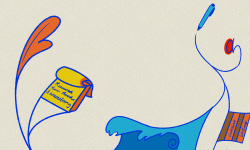On New Years’ Eve, my cousin and I fled to the back of a bar in my hometown and found a lonely corner table. As midnight approached and the local riffraff crept in on us, we made a series of joint New Years Resolutions. Chief among them was to get laid in ’07 (multiple times, if possible).
Admittedly, said resolution sounds somewhat crass and desperate, but I’m sure it wasn’t an uncommon pledge when the ball dropped. If I have noticed anything in people, it is that they tend to use relationships and love interests as milestones and reference points when they speak about their pasts. To a large degree, we judge those periods by the loves we had, which may lead us to over or undervalue our own accomplishments, and to skew our perspective.
I have certainly done this with my time here. Freshman year was marked, for instance, by a tumultuous relationship that went into a steep, fast decline at the beginning of sophomore year. It ended like a Hollywood car crash, with five or six explosions that dragged on for longer than necessary. The flames died out, but they left a wide patch of scorched earth.
Sophomore year may have been my happiest—after all, it was when I found The Voice and the friends I have today—but when I look back, those months are marked by profound loneliness and a fear of relationships with the opposite sex. Junior year, I dated a girl shortly before going abroad. Our first date ended with a kiss on the doorstep that dragged itself into her living room and on until shortly before sunrise, when I floated home past the long streets of row houses, euphoric. At the end of the second date, she was tense and quickly shuffled away with a peck on the cheek. Then, she stopped returning my phone calls.
If there is a reason people look back on their pasts this way, it is because those relationships teach us just how little self-knowledge we have. Even if we only come to see that our desires are confusing and our conceptions of relationships contradictory, these are still the richest interactions we will ever have with another human being, the best mirror into our very souls.
One morning this fall, I was walking with my girlfriend at the time toward campus through Burleith. At the intersection of 37th and Reservoir, I looked across toward the D6 bus stop and caught the eye of my first college girlfriend. A millisecond later, we had both looked away, and after I crossed, she had disappeared. But as I passed the bus stop, I saw her: hunkered down behind a large metal trash can, quietly speaking into a cell phone, hiding from me.
This all makes me think of a poem by Ruben Dario, in which he broke his life into four seasons, assigning to each a great love. Throughout this “Song of Autumn in Springtime,” he laments the loss of his childhood’s innocent, naïve view of love. He torments himself with the following refrain: “When I want to cry, I cannot / and sometimes I cry without wanting to.”
Dario, of course, was exceptionally romantic in his philosophy, and everyone who has suffered in a relationship probably wished love were something simpler. I can think of few, however, who feel that the greatest of loves was swept downstream into the past, out of sight and out of reach. We sense a glimmer of hope in the future, when what we have come to know in ourselves mixes with luck and everything falls into place. How shamefully beautiful it seems to me now, to use that as the marker, where the road meets the horizon and dips down into the hills.



